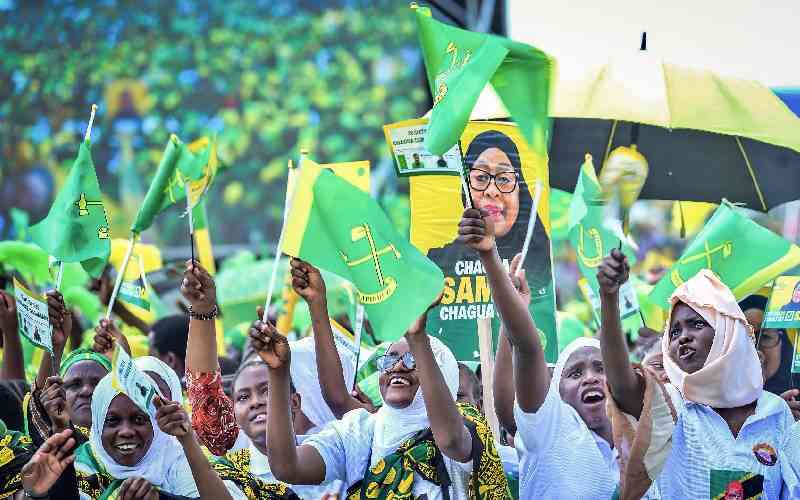Tanzania’s President Samia Suluhu Hassan takes the oath of office during her inauguration in Dodoma, on November 3, 2025. [Courtesy]
It’s the kind of headline that makes you blink twice. The kind you assume must be a typo. Yet there it was, the official figure in Tanzania’s presidential election. President Samia Suluhu Hassan declared the winner with a staggering 98 per cent of the vote.
Let that number sit for a second. Not 58, not 68, not even 78. Ninety-eight per cent. The kind of figure that doesn’t just raise eyebrows. It raises alarms. The kind of figure that insults the intelligence of every citizen who can count beyond ten. Because let’s be honest, nobody gets 98 per cent of anything in a real democracy. Not in a country of millions, not when people have real choices. And that’s the core of this story.
There were no choices in Tanzania. The opposition was not defeated; it was dismantled. Major rivals were disqualified on laughable technicalities or jailed on fabricated charges before campaigns even began. It was not an election. It was a coronation conducted under the illusion of choice.
Follow The Standard
channel
on WhatsApp
Picture this: you train for a race, show up at the track, and before the starting pistol fires, the organisers break your legs, then celebrate your failure to finish. That is not competition. That is control. Yet as fireworks lit up Dar es Salaam on election night, Samia Suluhu stood on stage draped in victory colours, declaring the election “free and democratic.” The cameras rolled. The diplomats smiled politely. The African Union issued its predictable congratulations. And once again, Africa was asked to applaud a charade dressed as democracy. Behind those staged celebrations lies a darker truth. Reports, credible, verified and chilling from diplomats, human rights observers, and opposition insiders suggest that between 500 and 1,000 Tanzanians were killed in the days surrounding the election.
Not detained. Not missing. Dead. Young men and women whose only crime was believing that their voices mattered. The government, of course, denies everything. “We condemn the violence,” President Samia said in her victory speech, as if the violence were a natural disaster, tragic, but beyond her control.
But make no mistake: this was not chaos. It was choreography. The violence was not spontaneous but systematic, a show of force meant to remind citizens that power in Tanzania does not flow from the people but from the state. And when the government cut off the entire internet, it was not a technical issue.
It was a blackout of accountability. A deliberate silencing of witnesses and evidence. When you sever a nation’s digital lifeline, you bury the truth before it can spread. By the time the connection returns, the bodies are buried, and history has been rewritten.
Tanzania’s 98 per cent election result is not just a local scandal. It is part of a broader continental pattern, the slow suffocation of democracy through democratic means. We were told, decades ago, that the era of strongmen was over. That Africa had turned the page from the generals in fatigues to presidents in suits. But what we have today are dictators fluent in the language of democracy. They speak of transparency while operating in secrecy. They praise freedom while jailing journalists. They hold elections, but only as rituals, ceremonies of legitimacy, not instruments of choice.
Look around. In Cameroon, Paul Biya has ruled since 1982. He has seen the fall of the Berlin Wall, invention of the internet, and birth of entire generations who have never known another president. In 2018, he “won” re-election with 71 per cent of the vote amid bloodshed and ballot stuffing. In Equatorial Guinea, Teodoro Obiang has been in power since 1979. In Congo-Brazzaville, Denis Sassou Nguesso has governed for four decades, punctuated only by brief interruptions of musical chairs. Across the continent, elections are increasingly coronations, tightly scripted performances where the ending is known before the curtain rises.
This hollowing out of democracy is the greatest political tragedy of our time. It is not just that leaders cling to power; it is that citizens are beginning to lose faith in democracy itself. When your vote never counts, when your protest gets you killed, when every election is a foregone conclusion, democracy stops feeling like a right and starts feeling like a scam.
That is why, across West and Central Africa, we are seeing young people cheering military coups, in Mali, Burkina Faso, Guinea, and Gabon. They are not celebrating soldiers; they are celebrating the fall of fake democracies. When you have been denied genuine choice for so long, even a soldier with a gun begins to look like hope.
Samia Suluhu Hassan may have her 98 per cent, but she is governing a nation that no longer believes in her legitimacy. That is not leadership. It is occupation. Her regime, like others before it, mistakes fear for loyalty and silence for consent. But suppression is not stability. The ghosts of the dead and the silence of the living are not the signs of a strong nation, but of a broken one.
Follow The Standard
channel
on WhatsApp
By Gitobu Imanyara
